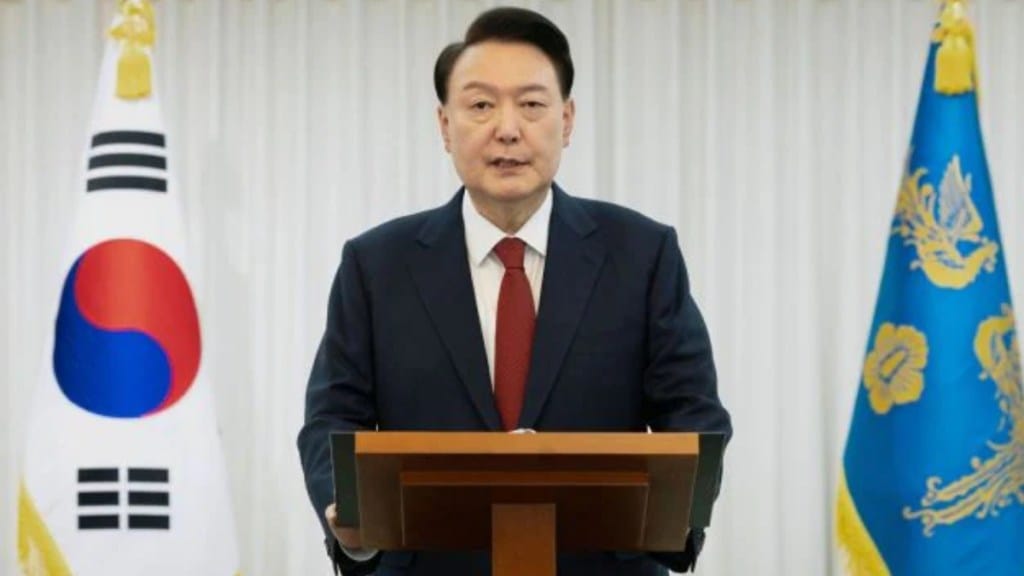South Korea is witnessing an unprecedented political crisis as impeached President Yoon Suk Yeol, facing allegations of authoritarian overreach and electoral fraud, seeks support from former U.S. President Donald Trump. The turmoil, marked by Yoon’s impeachment and an ongoing standoff over his arrest, has polarised the nation and raised questions about the stability of its democracy.
A Crisis Unfolds
The crisis began on December 3, 2024, when Yoon declared martial law, citing threats from “pro-North Korean anti-state forces” and alleged electoral fraud in April’s parliamentary elections. The move was widely condemned as unconstitutional and swiftly reversed by the National Assembly. Yoon was impeached on December 14, 2024, by a parliamentary majority, sparking nationwide protests both for and against his presidency.
On January 3, 2025, investigators attempted to arrest Yoon at his presidential residence, citing abuse of power and constitutional violations. Thousands of his supporters, waving South Korean and American flags, formed a human barricade to block law enforcement officials, echoing slogans reminiscent of Trump’s post-2020 election campaign. The phrase “Stop the Steal” was prominently displayed alongside calls for Trump’s intervention.
A Controversial Appeal
In a move drawing international attention, Yoon’s supporters have called on Trump to leverage his global influence to assist their embattled leader. Pro-Yoon rallies have increasingly adopted imagery and rhetoric aligned with the American far-right, portraying Trump as a potential saviour for South Korea’s democracy.
“Our country needs help to restore truth and freedom,” said one protester at the rally, holding a banner that read, “Trump, Save Korea.” This appeal highlights the deep ties between South Korea’s conservative factions and American evangelical movements, which have long viewed the US as a divine protector against communist influences.
Yoon himself has fueled this narrative, stating in a New Year’s Day message to supporters, “We stand united for justice, sovereignty, and freedom. Global allies who cherish these values will stand with us.”
The Legal and Political Stakes
As Yoon’s impeachment awaits a final verdict from South Korea’s Constitutional Court, the country is in a state of political limbo. Former Prime Minister Han Duck-soo has assumed the role of acting president. The court’s decision, expected within six months, will determine whether Yoon is permanently removed from office.
The impeachment has deepened divisions within South Korea’s electorate. While opposition parties and many citizens condemn Yoon’s actions as undemocratic, his conservative base, heavily influenced by evangelical Protestantism, views the impeachment as a conspiracy orchestrated by pro-North Korean elements.
A recent Korea Research poll revealed that 65% of Yoon’s party supporters believe the April parliamentary elections were fraudulent—a view shared by only 29% of the general public. Independent observers, however, found no evidence of irregularities.
Implications for South Korea and Beyond
The political crisis has significant implications for South Korea’s foreign policy and regional stability. The US, South Korea’s key ally, has reaffirmed its support for the country’s democratic institutions. In a carefully worded statement, the State Department emphasized its commitment to working with South Korea’s government while avoiding direct commentary on Yoon’s appeal to Trump.
“The United States values its alliance with South Korea and supports its democratic processes,” said a US spokesperson.
Domestically, Yoon’s impeachment has sparked debates about the role of populism, the influence of religious conservatism, and the spread of misinformation through online platforms. His supporters have relied heavily on far-right YouTube channels to disseminate claims of electoral fraud and bolster morale, mirroring tactics used in Trump’s political campaigns.
What Lies Ahead
The Constitutional Court’s deliberations will be closely watched, as will the evolving role of Yoon’s supporters in shaping South Korea’s political discourse. With Yoon vowing to “fight until the end” and his supporters drawing on transnational conservative ideologies, the crisis highlights the fragility of democratic norms in a polarised political environment.
Whether Donald Trump responds to Yoon’s appeal remains uncertain, but the parallels between their political movements suggest a deeper ideological alignment. As South Korea navigates this volatile period, the outcome will not only shape its domestic future but also send ripples across the global stage.


